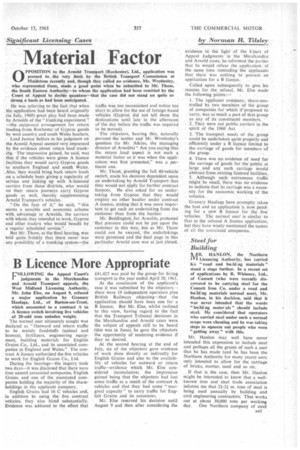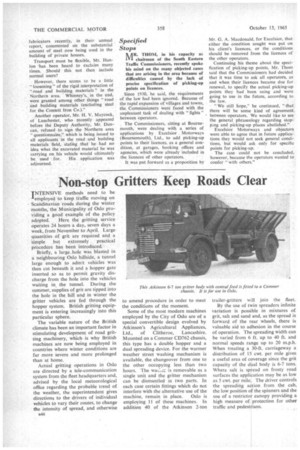B Licence More Appropriate
Page 79

Page 80

If you've noticed an error in this article please click here to report it so we can fix it.
rOLLOWING the Appeal Court's I judgments in the Merchandise and Arnold Transport appeals, the West Midland Licensing Authority, Mr. John Else, on August 9, refused a major application by Granary Haulage, Ltd., of Burton-on-Trent, which amounted to a contract A to A licence switch involving live vehicles of 20-odd tons unladen weight.
The normal user ultimately sought was declared as "Outward and return traffic to be mainly foodstuffs (animal and human), fertilizers, engineering equipment, building materials for English Grains Co., Ltd., and its associated companies in England and Wales." The contract A licence authorized the five vehicles to work for English Grains Co., Ltd.
During the hearings—the inquiry took two days—it was disclosed that there were four named associated companies, English Grains and one of the associated companies holding the majority of the shareholdings in the applicant company.
English Grains had 16 C vehicles and, in addition to using the five contract vehicles, they also hired substantially. Evidence was adduced to the effect that £41,427 was paid by the group for hiring transport in the year ended April 30, 1961.
At the conclusion of the applicant's case it was submitted by the objectors— there were 19 independent operators plus British Railways objecting—that the application should have been one for a B licence. But Mr. Else, whilst inclined to this view, having regard to the fact that the Transport Tribunal decisions in the Merchandise and Arnold cases were the subject of appeals still to be heard (this was in June), he gave the objectors the opportunity of tendering evidence if they so desired.
At the second hearing at the end of July, six of the objectors gave evidence of work done directly or indirectly for English Grains and also to the availability of vehicles for outward or return traffic—evidence which Mr. Else considered inconclusive; the impression gained being that the objectors had lost some traffic as a result of the contract A vehicles and that they had some "marginal capacity" to carry traffic for English Grains and its associates.
Mr. Else reserved his decision until August 9 and then after considering the
Steel for Building
]4R. HANLON, the Northern IVI Licensing Authority, has carried ha"road and buld:ng materials" stand a stage further. in a recent set of applications by R. Whinney, Ltd., of Consett (who were recently discovered to be carrying steel for the Consett Iron Co. under a road and bu:lding materials normal user), Mr. Hanlon, in his decision, said that it was never intended that the words "building niater"als " should include steel. He considered that operators who carried steel under such a normal scope were cheating and he was taking steps to squeeze out people who were "getting away" with this.
Mr. Hanlon may well have never intended this expression to include steel and perhaps all the grants of such a user that he has made (and he has been the Northern Authority for many years) were only intended to allow for the carriage of bricks, mortar, sand and so on.
If that is the case, then Mr. Hanlon might be interested to know that a wellknown iron and steel trade association informs me that 2+-4 m. tons of steel is being used annually by building and civil engineering contractors. That works out at about 10,000 tons per working day. One Northern company of steel fabricators recently, in their annual report, commented on the substantial amount of steel now being used in the building of private houses.
Transport must be flexible, Mr. Hanlon 'has been heard to exclaim many times. Should this not then include normal users?
However, there seems to be a little " loosening " of the rigid interpretation of "road and building materials" in the Northern area. Whinney's, in the end, were granted among other things "road and building materials (excluding steel for the Consett Iron Co.)."
Another operator, Mr. H. V. Maycock, of Lanchester, who recently appeared before the Deputy Authority, Mr. Duncan, refused to sign the Northern area "questionnaire," which is being issued to all applicants in the road and building materials field, stating that he had no idea what the excavated material he was carrying on his vehicle would ultimately be used for. His application was adjourned.
Specified Stops
mR. THOM, in his capacity as chairman of the South Eastern Traffic Commissioners, recently spoke his mind on the many objected cases that are arising in the area because of difficulties caused by the lack of precise specification of picking-up points on licences.
Since 1930, he said, the requirements of the law had been ignored. Because of the rapid expansion of villages and towns, the Commissioners were faced with the unpleasant task of dealing with " fights " between operators.
The Commissioners, sitting at Bournemouth, were dealing with a series of applications by Excelsior Motorways (Bournemouth), Ltd., to add picking-up points to their licences, as a general condition, at garages, booking offices and agencies, which were already included in the licences of other operators.
It was put forward as a proposition by
Mr. G. A. Macdonald, for Excelsior, that either the condition sought was put on his client's licences, or the conditions should be removed from the licences of the other operators.
Continuing his theme about the specification of picking-up points, Mr. fhom said that the Commissioners had decided that it was time to ask all operators, as and when their licences became due for renewal, to specify the actual picking-up points they had been using and were going to use in the future, according to the law.
"We still hope," he continued, " that there will be some kind of agreement between operators. We would like to see the general phraseology regarding stopping and picking-up places abolished."
Excelsior Motorways and objectors were able to agree that in future applications they would not seek general conditions, but would ask only for specific points for picking-up. • The case could not be concluded. however, because the operators wanted to confer "with others."




































































































































